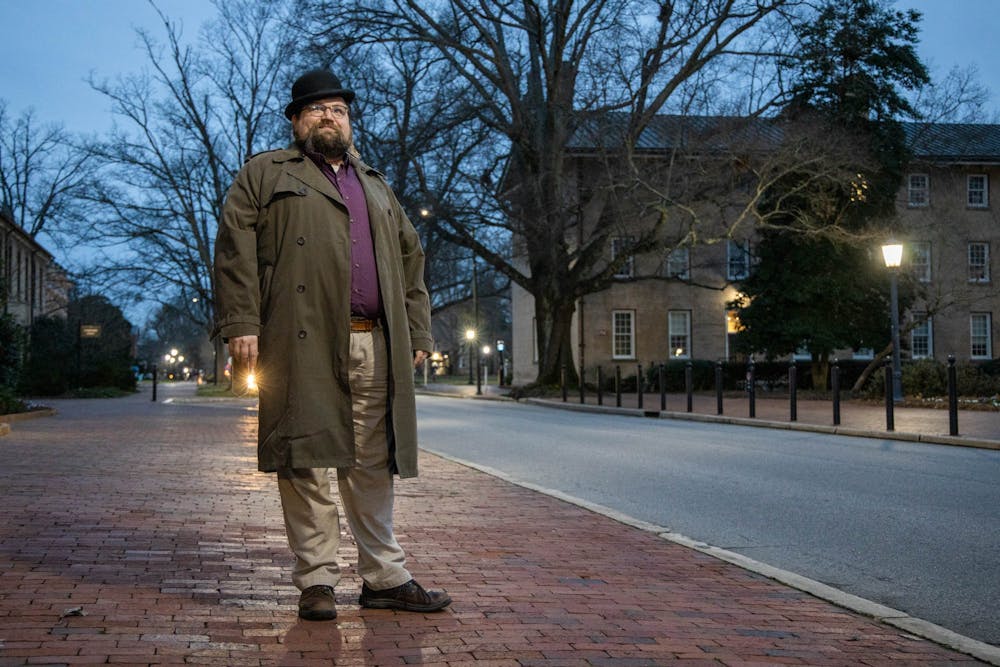Jenkins recruited various volunteers from around North Carolina including sheriffs, lawyers and criminal justice scholars who meet weekly on virtual calls to offer their perspectives and write recommendations to improve the system.
“I think that (Jenkins') ability to draw people into the discussion from different perspectives is really important,” Nackman said. “You solve these problems by getting people who have different perspectives to talk to each other and work together to come up with potential solutions.”
Jenkins said he contacted his college friend Aaron Randol, another UNC graduate and an employee in the auxiliary services office, to help edit the document. Randol’s role was to find glaring omissions and to provide an outside opinion on their work. He made suggestions and changes based on what could be confusing to someone who did not help write the recommendations.
Randol said he hopes that what started as a grassroots movement will grow, starting with changes being made in North Carolina and eventually policies being implemented at national levels.
Inspired by the 1980s films he grew up watching, Jenkins said he also recruited his neighbors’ younger daughters to review the document for errors.
“In every '80s movie, there's a plot hole that a 10-year-old can see," he said.
Jenkins said that the girls are included in the Noble Prize nomination as they spotted poor wording in certain sections and mistakes, such as not specifying required timeframes for reporting incidents.
“I’m most proud of the results,” Randol said. “We have a policy that is succinct but directed at critical portions of what we believe is wrong with the current situation. This is getting the ball rolling, but unfortunately, it is still a long uphill battle.”
Neta supports the committee's goal to create specific, realistic solutions to reform the justice system while working with law enforcement to do it. He said he spent hours applying to be a nominator and filling out paperwork to officially nominate the committee for the Nobel Peace Prize.
He doesn’t expect the group to win, but hopes the nomination builds momentum for the work.
“I think the nomination shows that Professor Neta thinks that there’s real promise to the work and he wanted to bring attention to it,” Nackman said. “What I would hope is since the work is still ongoing, that maybe some other people will decide to join in on the work and we need people from all different parts of the community because it affects all different parts of the community.”
All of the Progressive Caucus’ action teams are open to public participation, Nackman said.
To get the day's news and headlines in your inbox each morning, sign up for our email newsletters.
Randol said that beyond contributing to the work of the committee, people can contact and pressure their local, state and national level politicians to vote to put these policies in place.
Moving forward, the committee will present its recommendations to various political leaders, including Congressman David Price and Senators Natalie Murdock and Mike Woodard. Additionally, it will encourage police around the state to adopt some of the key elements of the recommendations.
“We have a running joke in the committee that we’re writing our acceptance speech,” Jenkins said. “In reality, we’re hoping that we can get some publicity and push this process forward and maybe fast-track it because every day that we wait, people are getting killed.”
Here is a list of the total contributors to the committee's work: Ryan Jenkins, Larry Dodson, Leslie Roth, Kerry Peay, Shelia Ann Huggins, Tobias Voss, Garrett K Lagan, Clarence Birkhead, Aaron Randol, Richard Kohn, Roseanna Groves, Mallory Demonch, Senators Mike Woodard and Natalie Murdock, Ian Nevarez, Josh Howard, Benjamin Secrist, Marc Böttler, Mark Lawrence, Lee Nackman, Allan Jeffries, Andrew Havens, James Anderson, Adrienne Madry, Alexandra Hall Miles, Michael Childress, Seth Stoughton, Levon Barnes, Seth Peavy, Emma Hollar, Scott Koon
university@dailytarheel.com




